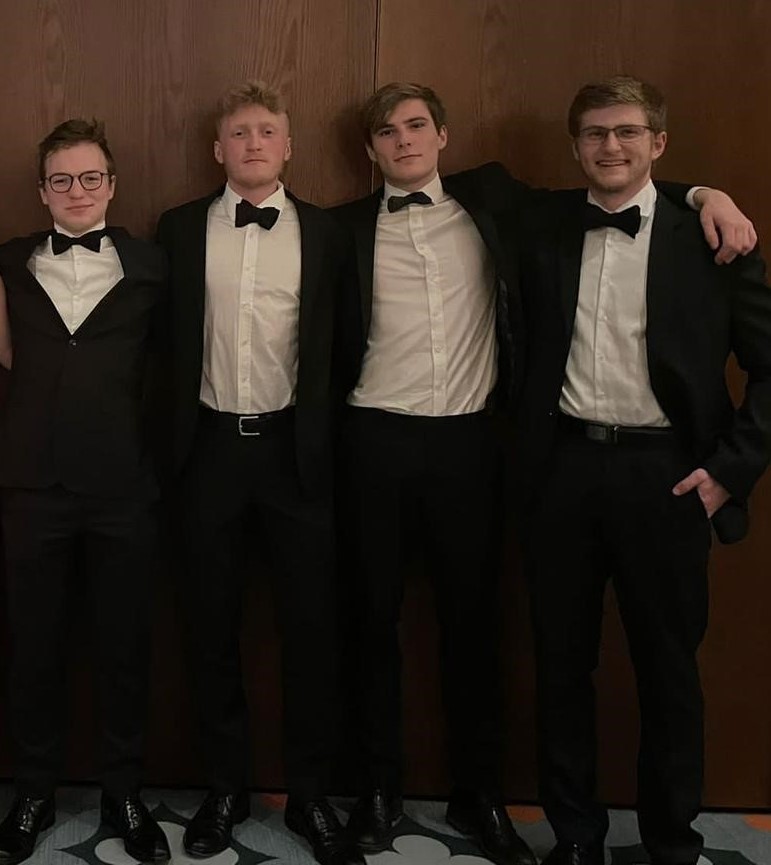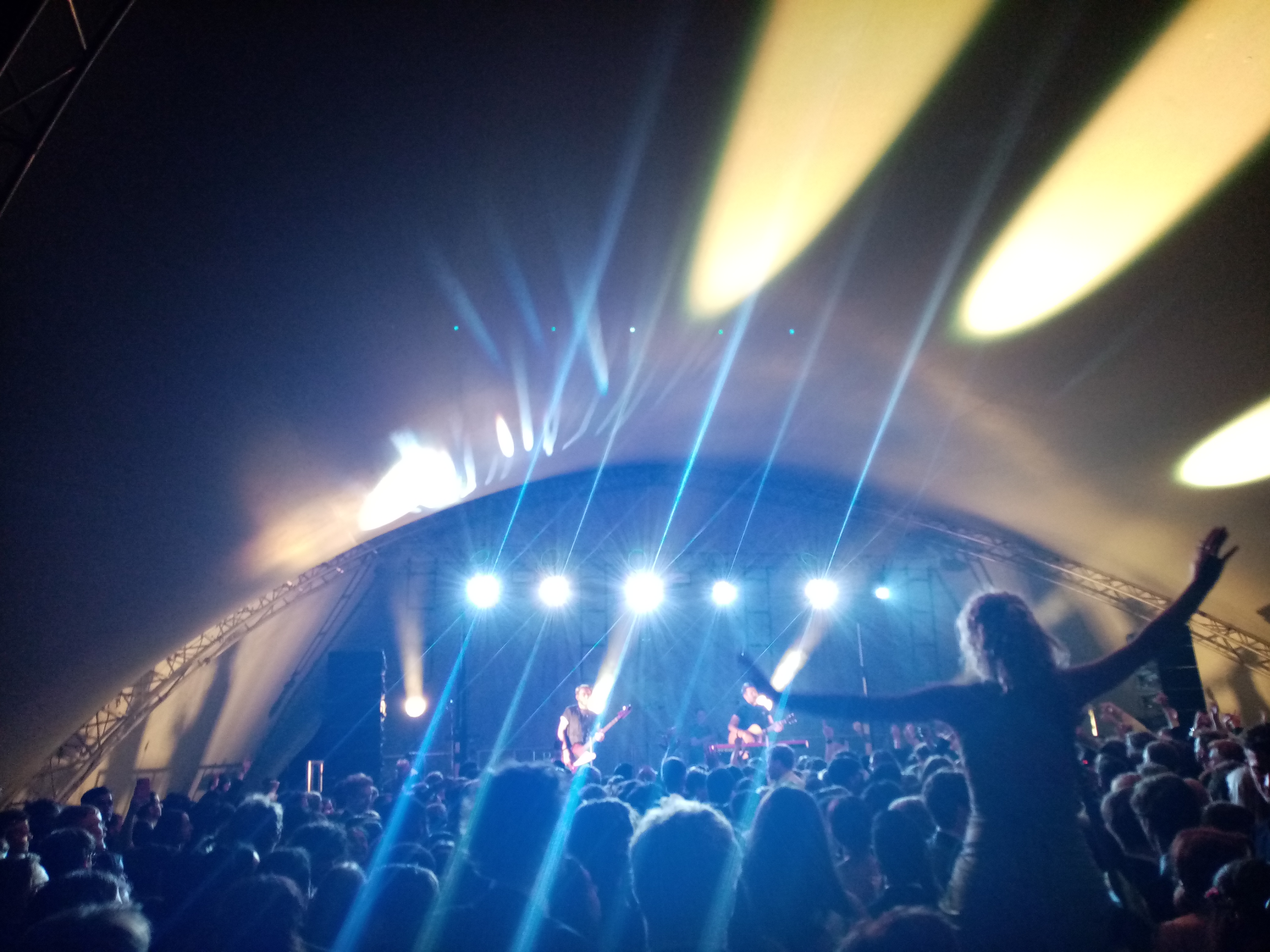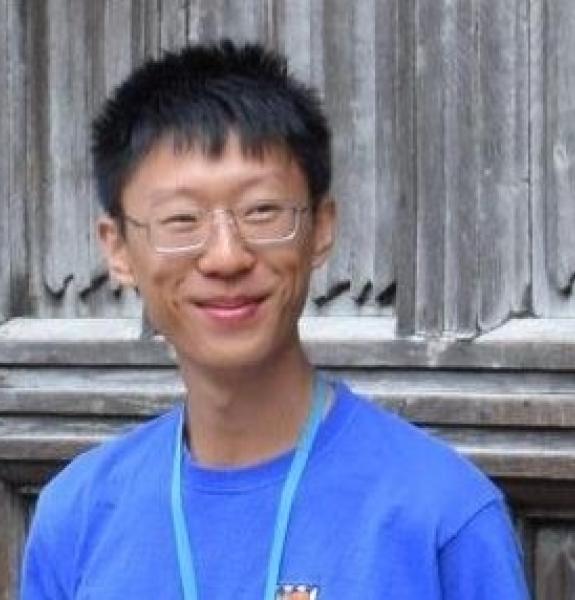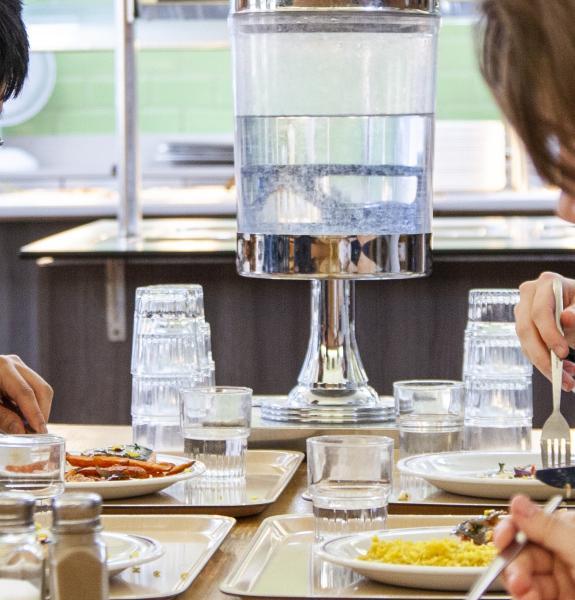We have more than one mathematician called James! This James is from Aldbourne, Wiltshire (South-East England) and wrote this at the end of his second year studying Mathematics at Christ's. He did A-Levels in Maths, Further Maths, Physics and Chemistry as well as STEP papers.
What attracted you to studying your course here?
A lot of it was about reputation: I'm a bit biased, but I think that the Cambridge maths course is one of the best in the UK, maybe even the world. I went to open days at both Cambridge and Oxford to see what they were like. The main reason I went for Cambridge in the end was because of Christ's: out of all the Oxford and Cambridge colleges that I saw, Christ's was definitely my favourite. I went to a few of the bigger colleges first, and they just didn't feel as welcoming. An aspect of Christ's that really attracted me was its size: I like that it's small enough to get to know everyone. I feel like our whole year group is quite close, and I can have a chat with pretty much everyone I see around College. The bigger ones didn't feel as homely, and certainly a lot more daunting. The smaller courts at Christs makes it feel like there are always people around, because everything is less spread out. As well as being right in the centre of town, Christ's was bustling, and everyone I met on the Open Day was really friendly. I knew as soon as I came in through the gate that this was the place for me.
What was it like starting your course?

My biggest worry was about being able to keep up with the pace of the course. This was exacerbated by finding out about Christ's reputation as a very academic-focused college: that wasn't something I knew about before I applied. First year was definitely a challenge: I realised quickly on that there was a big step up between maths A-level and my degree. Only the first couple of lectures in each subject recapped what we'd done in A-Level Further Maths. After that, it was all brand new. A big challenge initially was that I wasn't very good at presenting my work; I had to change the way I laid things out because my supervisors couldn't read my assignments! My Director of Studies, Dr Hunt, was very helpful with this, however, and showed me some alternative ways of presenting my work. First year in general was a lot of work, and I had to put in a good deal of effort to make sure I was keeping up with everyone on my course. But as time has gone on, I've become a lot more comfortable with where I am academically and have settled into the rhythm of it.
One thing that really helped with the early days of my course was having the opportunity to interact with other mathematicians. Christ's is really good for that – in the first week or so we had a few 'subject social' events. Getting to know them quickly allowed me to see how working with them might make things easier for all of us.
What is your favourite place in College?
I really like Third Court, especially to work in. Particularly in the summer, it's a really pretty place to do some work, or just go to chill out. I would do all of my work sat out there if I could; but because I do so much of my work on paper, it doesn't go so well when it's windy!
What do you think of the collegiate system in general?
I think it has a lot of advantages. Firstly, it is a lot easier to get the student voice heard in decision-making because you can go through the College's JCR, our students' union. This bridges the gap between students and academics a lot more closely than is the case for other universities. Secondly, it gives us access to more experiences and facilities. For instance, while at another university you might only be able to one, perhaps two, different sports (because it takes so much commitment to stay on the University-wide teams), college-level sports enable you to take part in sport for fun without the same level of commitment: you can show up for a Sunday football match without the pressure of representing your university.
What advice would you give to students struggling to choose a College?

I say to go to as many colleges as you can, because getting a good feeling about the place is important, and often one or two will just stand out to you after doing that. Also, have a think about what you want to be doing while you're at university: are you very arty, are you musical, are you sporty? You can then have a look at which colleges have the best facilities for the activities you enjoy.
How did you go about the application process?
I was really worried about my personal statement: it was by far the longest thing I'd had to write since since taking my GCSEs! In hindsight, I think I thought too much about how it should be written: for a maths application, getting across the content of what you want to say and the things you've done is probably more important. I spoke a bit about taking part in the UKMT 'Maths Challenge', which is something a lot of maths applicants write about. If you've done it, it's worth mentioning in there because it shows a different style of problem-solving from A-level work. It's about demonstrating how interested you are in the subject in any way you can: entering competitions, having a go at other projects, even reading a book (I read Stephen Hawking's "A Brief History of Time") can all show that.
To prepare for interview, I did get a mock interview from a nearby school, which helped a little. I would say the most helpful thing to do is practice questions (looking at STEP questions – the Cambridge admissions assessment for maths – might help with this) and working through them out loud. They are usually layered problems with lots of steps, which they can lead you through; being able to make clear what you are thinking during each stage is really important. Each layer gets a bit harder: there will be a point in each one where you get a little stuck, and that's absoloutely fine.
In terms of interviews, this is the big piece of advice I would bear in mind. They aren't looking for how good you are at solving the problems they give you, so much as how you respond to the ones that you find difficult. I had two interviews, and one question sheet that I did on the day of the interviews. In one of the interviews, we went through the question sheet and my thought processes. I got a lot of questions in the initial question sheet quite wrong, making a lot of silly errors. But in the interview, I picked up on these and corrected them, adapting to the information and ideas they gave me as we went through it. There was a lot of maths in the interviews that I hadn't seen before: there were a few ideas from A-Level that I could apply, but I think a lot of what they were testing was how I worked with new ideas.
The other part of the admissions process you need to prepare for is STEP. Again, the most useful thing you can do is practice lots of questions. There's a lot of resources online, including the STEP support programme from Cambridge and a database of practice questions.; I'd recommend starting to look at their Foundation Modules around the end of Year 12. I was quite late in starting mine, and would have appreciated a bit more revision time. You'll probably find that preparing for STEP and practicing questions will help your A-Level revision a lot too.
What were you looking forward to before starting here?

I was really looking forward to meeting new people. I really like conversations where nobody knows each other, and finding out new things about the people around me (mathematicians have a bit of a reputation for being very introverted – not always the case!) and I felt that University was an opportunity to really be myself with a whole now crowd. I loved interacting with all these people and joining lots of societies in the first couple of weeks. There were so many new things to try, and I was really excited for all of it!
How did you find settling in?
I lived in Staircase P in first year, which is just behind Third Court. It's a little separate from the other in-college accommodation, and as a result I became close with my housemates quite quickly. We spent a lot of time together as we settled in and eventually found our own groups of friends. I really appreciated having the common rooms to go to in college: there were days when I would come in from contact hours, drop off my bags in my room, and immediately go to say hello to whoever was in there. First-years at Cambridge are also given a "college family", which is a pair of second-years with similar interests who can keep an eye out for you in the first few weeks. It was comforting to know they are on the other end of the phone if I needed them, and their advice was invaluable as I settled in.
One of the most surprising things about starting at Cambridge was that the people around me tended to have a similar mindset. I was a little worried that everyone around me would be super-focused on academic stuff, and not willing to try new things. That wasn't specifically a Cambridge concern; I think everyone starting university worries that they won't find their kind of people. I'd reassure them that in a place as big as a university, there are all kinds of people around, and you're bound to find others who share your interests and ideas.
How did you find starting lectures and supervisions?
I was surprised at how informal lectures were – the lecturers were very laid back and quite chatty. You can even ask questions while the lecture is going on, it's all really dynamic between students and lecturers.
I wasn't sure what to expect from supervisions, which are the very-small-group teaching that happens at Cambridge. Obviously at school I'd been used to big classes of about 30, but these were usually just two of us and a supervisor. Our Director of Studies (an academic in our subject who oversees our teaching and academic experience) was good at switching around the pairs so we got to be with everyone on our course at Christ's at some point, which was really nice. They went a lot better than I was expecting, and I took a lot from having that really individualised attention.
What's different about the work you do now, compared to A-Level?

I found that a lot of the stuff we did at school got a bit repetitive, especially as you get closer to exams. You learn the content, you learn the format of the questions, you apply what you know, and you practice it over and over. University maths involves a lot more of your own research, and applying what you know to totally new areas. I find myself asking a lot more questions about what I learn, I didn't find maths this intriguing when I did it at school.
What does your timetable look like?
We generally have about 12 lectures a week: 2 per day, but none on Sunday. That varies a bit depending on what you take: I imagine it will go down in third year as I've specialised a little bit more. There tend to be two or three supervisions a week. In first year, it was always two a week, but depending on how many topics you take there can sometimes be extra ones. In first year there isn't that much choice in what you do, because you are expected to do pretty much everything. In second year and third year, you can choose what you do, and even how many topics you do, as long as you meet some minimum requirements. All of the topics are examined across all of the papers, so you have to make your decisions so you don't end up with no questions you've prepared for one one of the papers, but you are guided through how to make those choices.
In first year at Christ's, we also get classes once a week, each about an hour and a half long, with all of us in our year on our course. That's a Christ's specific thing. It's a 90 minute session with all the maths students at Christ's in your year (8-10 people), discussing various topics that come up in the lectures. We would have one applied session and one pure session a fortnight, so it came to one session a week. We had about two classes per course and the supervisor would generally ask for topics that the students want to cover, then ask questions and talk people through the difficult paarts of the topics which they've seen in lectures to help students understand all the material. If nobody had any particular topics in minc, they would just talk about the harder or more recent areas, which really helped make sure we weren't falling behind on lecture material. It was also the main time when all the mathemeticians in our year were together, so it was a nice opportunity to have a catch up with everyone (obviously after the class had ended!) and really get to know all the people in our year.
What has been your favourite topic from this year?
I really enjoyed studying Electromagnetism this year! To begin with, I found it really difficult to follow: the course covers a lot so there was a large amount of information to absorb. But looking back over it, I realised how cool it was. Towards the end of the topic, we started delving into special relativity and stuff like that, which I thought was really interesting. We ended up looking at how magnetism is effectively a special relativistic effect of electric fields, which is why the two are studied together so much. I really enjoyed learning about it.
How do you manage your workload?

I really wish there was a straightforward answer to this! Unfortunately, it's just something you have to work out for yourself. The workload is heavy, and everyone is going to adapt to it at different rates, and will need to work on different areas of the subject. Luckily, the first and second year of maths doesn't actually count towards your degree, so you do have a bit of time to figure it out! I'm not sure I've totally mastered it yet to be honest, but it is something you get your head around over time.
Where do you like to work?
I quite like working in the more social areas, so I can occasionally take a break, step away, and chat to people around me. As weird as it sounds, having the opportunity to do other things at regular intervals helps keep me engaged on my work. The Buttery, which I worked in a lot last term, was a really great place for that. Other than that, I'd occasionally work in the Library, or the Plumb Auditorium (one of the study spaces College opens up during exam term). I like to make sure I'm in a place where a break will involve a little bit of socialising, rather than staying in my seat on my phone.
What do you do when you're not working?

I like doing a lot of sport: this year, I took up rowing, which has been a big commitment, but I've loved it. Next year, I'm going to be Lower Boat Captain, which is someone who manages all the new rowers and sorting them into boats. It's something I'm really looking forward to! I also play Sunday football with the College second team, which is always good fun, and more of a social game than working hard to reach the top of the division like the First Team do. I also occasionally do other sports: last year me and my friends started setting up a slack-lining society, and I also go climbing at Kelsey Kerridge (a nearby sports centre) with the College Climbing Society. College sport has been a highlight of my time at Christ's, it's really easy to get into a brand new sport with little effort or experience. Last term, me and some friends formed a mixed lacrosse team, despite none of us really knowing how to play!
For me, societies have been a key way to meet new people and get involved in student life. I didn't appreciate when I started how many events they put on and the opportunities they open up. This is true at a college level, but also a university one: joining a society massively opens up the number of people from across the university you are exposed to. They also often put on balls and garden parties, which are big social events and good fun. I didn't work out at first that societies can make socialising much easier, so I'd really recommend that first-years take the opportunity to seek out things that they might be interested in joining in with,
Did you prefer your first- or second-year accommodation?
In first year, I lived in P staircase in Third Court. I liked the staircase, and was in a small non-ensuite room: the cheapest in college. The low rent was good, and I didn't spend that much time in there: even when I was working I would go somewhere with more space and more people. This year, I lived in one of the houses just behind the College, on Jesus Lane. It was really nice to live with my mates in a whole house to ourselves. We had a load of rowers next door, so we could do our early-morning get-ups together. Overall, I preferred by second-year accommodation, because of the independence that comes with living off the main college site, and the people I was staying with.

How do you spend your holidays?
I like to relax when I go back home. Usually, the first couple weeks are spent catching up on the work I've put to one side during term, but I try to get that out of the way so I can enjoy the break. Mostly, I just spend it with my family.
This year, I went on the Varsity skiing trip in December. It was so good, much better than I was expecting! I've snowboarded a couple of times before (although not for quite some time), so I went as a snowboarder. It was really good fun, at the end we got a load of really nice powder snow so I could go fast. The trip itself was really well organised and we all had a great time.
What are you looking forward to next year?
One of the highlights of the course (for me at least) is coming up next year. We're looking into General Relativity. It sounds daunting, because apparently it's much harder than a lot of the stuff we've done so far, but from what I've seen, it's going to be really interesting. That's the thing I'm most looking forward to academically.

Other than that, I'm looking forward to going to some more May Balls next year. These are big parties that take place in different College's after exams: ours started at 8pm and went on until 6am the next morning. The 2022 Christ's May Ball was brilliant and quite surreal, I've never been to anything remotely close to it. Firstly, the fact it was formal dress was cool and made getting ready and dressed up kind of exciting in itself! My favourite bit was probably the food and drink: we had stands giving away food and drink until the very end. I'd never been to something where you just pay for a ticket and everything else is included (so you could just walk up to a bar or stand and be given food and drink!), and I definitely had my fill of sushi and pizza! The music line-up was really good, too. Scouting for Girls was the headliner and the final band, Soft Crunchy Landings, was an amazing way to see through the night. I would love to experience some at other Colleges.
I'm hoping to do a fourth year, but if I don't end up staying on to do that for whatever reason, I want to make sure my last year here is as good as possible. As much as the academic side is important, I want to have as good a time as I can; a lot of my third year will be trying to keep that balance.
Please be aware if you're considering an application that our student writers describe their experiences. Although the majority of the information stays the same, some details may change from year to year. Do read the student profiles in combination with our undergraduate admissions pages for full information
July 2022
Student profiles / Mathematics at Christ's / Maths Open Day / Next: Anna's profile



